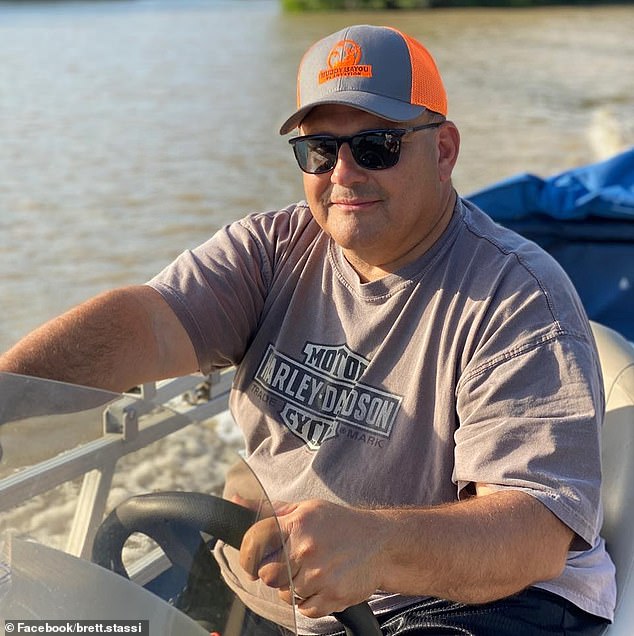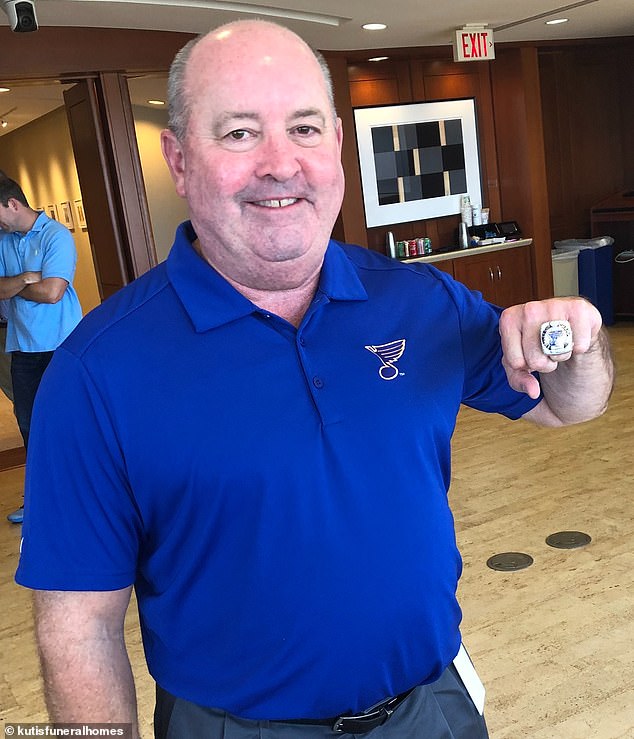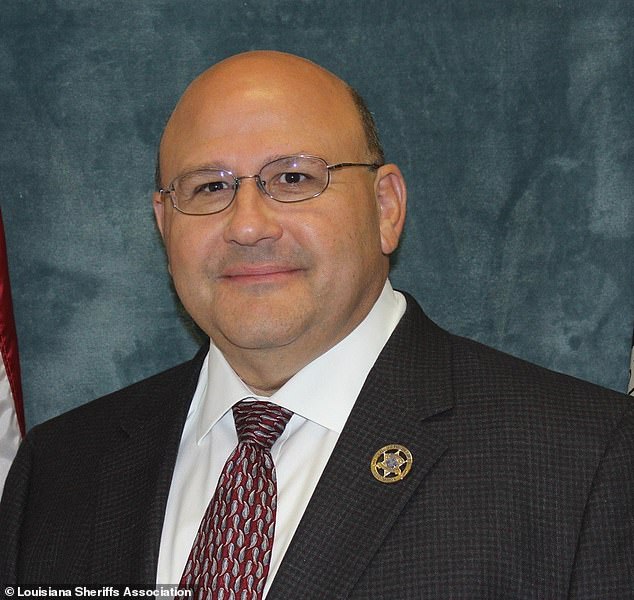A 62-year-old Louisiana man battled kidney cancer he believes was caused by his sleep apnea respirator made by health technology giant Philips.
Sheriff Brett Stassi had been using his Philips DreamStation CPAP mask every night for four years to treat his sleep apnea and often found small black particles on his pillow left by the machine.
It wasn’t until a recall of the devices in June 2021 that he learned those particles were far from harmless.
He said: “You worry about dying in your sleep and discover the machine could be causing more harm than the apnea.”
A month before the recall, Stassi underwent emergency surgery after a routine doctor’s visit discovered he had kidney cancer. He had to undergo surgery to remove his right kidney, according to reports ProPública.
While the sheriff is now in remission, nearly 600 people who used the now-recalled CPAP machines have died in the past three years from illnesses related to the foam and potentially toxic gases that enter users’ airways while using the device.
Philips has recalled millions of defective sleep apnea ventilators amid a growing mountain of cases in which long-time users have been diagnosed with cancer, pneumonia, asthma and other serious health problems.
Sheriff Brett Stassi, 62, used the Philips DreamStation for four years before undergoing emergency surgery when his doctor discovered he had kidney cancer. Only after the recall did he learn that the black flecks in his CPAP could damage his kidneys and liver.

Sheriff Stassi is one of hundreds of people suing Philips whose fans contained foam that emitted carcinogenic gases, including formaldehyde, benzene and methylene chloride.
Now, the Food and Drug Administration has reported that since it initiated a recall of approximately 15 million devices in 2021, 561 CPAP users have died as a result of illnesses related to faulty machines, while thousands of people battle other serious health conditions.
The deaths were recorded in 116,000 medical device reports, the FDA’s database for reporting adverse events. From July to September 2023 alone, 111 deaths were recorded, out of a total of more than 7,000 medical device reports filed in that short period.
Millions of people suffer from sleep apnea, a condition characterized by pauses in breathing or shallow breathing during sleep that, over time, greatly increases the risk of heart attack and stroke.
An estimated eight million Americans rely on a CPAP machine to sleep through the night, and given Philips’ status as a market leader in CPAP devices, a large portion of those eight million devices are likely included in the recall. .
The problem arises from the type of foam used in the machine’s helmet, which attaches around the head and connects to a snorkel-like device. It is intended to dampen sound and vibrations while the machine is operating.
But the foam, made with polyester-based polyurethane, has been shown to degrade and break down into small particles and release harmful chemical gases such as formaldehyde, benzene, methylene chloride, volatile organic compounds and solvents, all of which have been linked with different types of cancers and respiratory problems.
The device is used to treat sleep apnea by delivering continuous pressurized air through a person’s airway through a mask connected to a tube.
The airflow pressure is high enough to prevent the airways from collapsing when the muscles at the back of the throat relax, resulting in continuous sleep without abrupt awakenings or choking.
Terry Flynn, a St. Louis native and father of four, lost his battle with esophageal cancer in 2021, just two weeks after receiving the diagnosis, according to a report from ProPública.
The 63-year-old had used a recalled Philips device for nine years, and although his family will never know if the faulty device was the exact cause of his illness, they blamed the company for not warning about the health risks sooner.
Meanwhile, Mark Edwards, a 58-year-old retired music teacher and father of three, has for years experienced recurring respiratory infections and benign tumors that he believes were caused by the Philips DreamStation ventilator.
He said PBS News: ‘When I used my new machine for the first time, I noticed that we were seeing black specks and white specks; it just went from being pure, distilled water to looking like water you would see in a polluted stream.
‘The walls of my lungs are now shattered. Then they will never work again. I can’t get a lung transplant because no one will want to transplant your lung to an infected area where it will just go bad.’
Also in New York, a man named Lawrence Braverman sued Philips for claiming that his machine, which he had been using since 2011, had caused repeated attacks of mouth cancer starting in 2015.
A biopsy and surgical removal of parts of his mouth and tongue were required, and he was forced to use a feeding tube.

Terry Flynn of St Louis, Missouri, died of esophageal cancer in 2021, just two weeks after being diagnosed. His family will never know for sure that the Philips machine caused his fatal cancer, but they blame the company for not warning customers sooner.

Mark Edwards, pictured left, is a retired music teacher and father of three who used the Philips DreamStation ventilator from 2017 to 2021. He has suffered several bouts of severe respiratory infections and two benign throat tumors.
Foam near machine nozzles has been linked to more than just throat and oral cancers.
In Johnson County, Kansas, Robert Dix, 70, was diagnosed with lung cancer at the end of 2019. I had been using the Philips Respironics DreamStation automatic CPAP device since 2016.
According to his lawsuit against the company, he faces permanent disability and “now requires constant and ongoing medical monitoring and treatment due to the defective nature of the device at issue and/or the unlawful conduct of the defendants.”
These trials, like approximately 700 more peopleare in progress.
The FDA this week announced a settlement it reached with Philips, formally known as a consent decree, that stipulated that the company would stop all sales of its sleep apnea masks in the United States.
In addition to recalling CPAP, or continuous positive airway pressure, machines, the company is recalling several similar BiPAP, or bilevel positive airway pressure, machines.
At the same time, it will have to take massive measures to fix problems with the devices, a task that Philips executives estimate will cost approximately $393 million.
The company’s efforts to fix faulty devices starting in 2021 have been a lengthy process and have frustrated users who need the devices to sleep. As recalls expanded beyond the original to five million devices, repair or replacement efforts have been extended into 2024.
Recent inform of ProPublica revealed that Philips knew the foam in its products was defective and potentially dangerous long before it was made public.
Philips concealed more than 3,700 complaints about the machines, including 370 reports of deaths, from the FDA for 11 years before the recall.
Philips had seen examples of foam breaking down in its fans in Japan and had conducted tests in the United States that showed the black flecks releasing gaseous chemicals. Still, the company did not warn the public.
The company did not launch a formal investigation into the issue until 2019, nine years after the initial wave of complaints and three years after the company’s first known tests revealed foam degradation.
Last September, Philips agreed to pay $479 million to settle a CPAP class action lawsuit to anyone who bought, rented or rented one of the recalled devices.
Philips faces another 750 lawsuits, meaning punitive damages imposed on the company will likely run into tens of millions of dollars.

